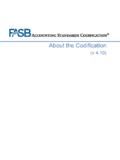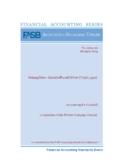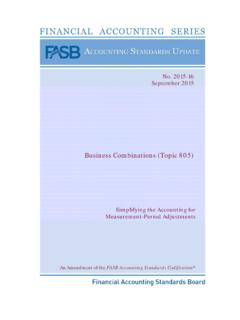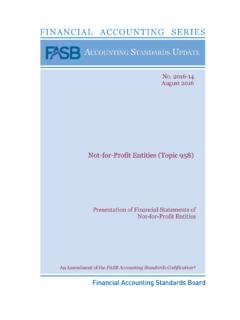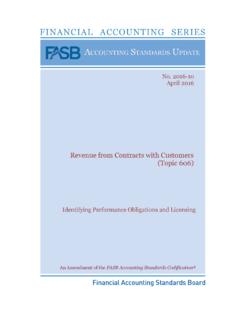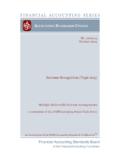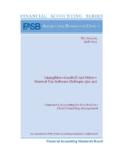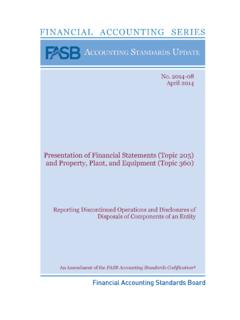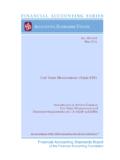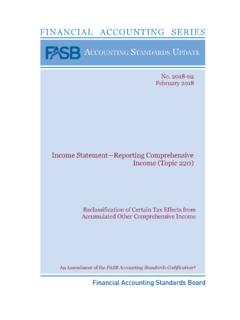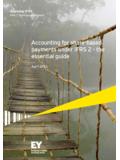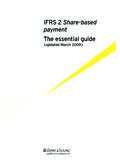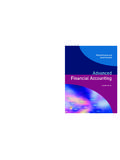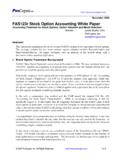Transcription of Compensation—Stock Compensation (Topic 718)
1 Compensation Stock Compensation (Topic 718) No. 2014-12 June 2014 accounting for Share- based payments When the Terms of an Award Provide That a Performance Target Could Be Achieved after the Requisite Service Period a consensus of the FASB Emerging Issues Task Force An Amendment of the FASB accounting Standards Codification The FASB accounting Standards Codification is the source of authoritative generally accepted accounting principles (GAAP) recognized by the FASB to be applied by nongovernmental entities. An accounting Standards Update is not authoritative; rather, it is a document that communicates how the accounting Standards Codification is being amended. It also provides other information to help a user of GAAP understand how and why GAAP is changing and when the changes will be effective. For additional copies of this accounting Standards Update and information on applicable prices and discount rates contact: Order Department Financial accounting Standards Board 401 Merritt 7 PO Box 5116 Norwalk, CT 06856-5116 Please ask for our Product Code No.
2 ASU2014-12. FINANCIAL accounting SERIES (ISSN 0885-9051) is published quarterly by the Financial accounting Foundation. Periodicals postage paid at Norwalk, CT and at additional mailing offices. The full subscription rate is $242 per year. POSTMASTER: Send address changes to Financial accounting Standards Board, 401 Merritt 7, PO Box 5116, Norwalk, CT 06856-5116. | No. 401 Copyright 2014 by Financial accounting Foundation. All rights reserved. Content copyrighted by Financial accounting Foundation may not be reproduced, stored in a retrieval system, or transmitted, in any form or by any means, electronic, mechanical, photocopying, recording, or otherwise, without the prior written permission of the Financial accounting Foundation. Financial accounting Foundation claims no copyright in any portion hereof that constitutes a work of the United States Government.
3 An Amendment of the FASB accounting Standards Codification No. 2014-12 June 2014 Compensation Stock Compensation (Topic 718) accounting for Share- based payments When the Terms of an Award Provide That a Performance Target Could Be Achieved after the Requisite Service Period accounting Standards Update Financial accounting Standards Board accounting Standards Update 2014-12 Compensation Stock Compensation (Topic 718) accounting for Share- based payments When the Terms of an Award Provide That a Performance Target Could Be Achieved after the Requisite Service Period June 2014 CONTENTS Page Numbers Summary .. 1 3 Amendments to the FASB accounting Standards Codification .. 5 7 Background Information and Basis for Conclusions .. 8 14 Amendments to the XBRL Taxonomy .. 15 1 Summary Why Is the FASB Issuing This accounting Standards Update (Update)? Entities commonly issue share- based payment awards that require a specific performance target to be achieved in order for employees to become eligible to vest in the awards.
4 Examples of performance targets include an entity attaining a specified profitability metric or selling shares in an initial public offering. Generally, an award with a performance target also requires an employee to render service until the performance target is achieved. In some cases, however, the terms of an award may provide that the performance target could be achieved after an employee completes the requisite service period. That is, the employee would be eligible to vest in the award regardless of whether the employee is rendering service on the date the performance target is achieved. Current generally accepted accounting principles do not contain explicit guidance on how to account for those share- based payments . Many reporting entities account for performance targets that could be achieved after the requisite service period as performance conditions that affect the vesting of the award and, therefore, do not reflect the performance target in the estimate of the grant-date fair value of the award.
5 Other reporting entities treat those performance targets as nonvesting conditions that affect the grant-date fair value of the award. This Update is intended to resolve the diverse accounting treatment of those awards in practice. Who Is Affected by the Amendments in This Update? The amendments in this Update apply to all reporting entities that grant their employees share- based payments in which the terms of the award provide that a performance target that affects vesting could be achieved after the requisite service period. That is the case when an employee is eligible to retire or otherwise terminate employment before the end of the period in which a performance target (for example, an initial public offering or a profitability target) could be achieved and still be eligible to vest in the award if and when the performance target is achieved. What Are the Main Provisions?
6 The amendments require that a performance target that affects vesting and that could be achieved after the requisite service period be treated as a performance condition. A reporting entity should apply existing guidance in Topic 718 as it 2 relates to awards with performance conditions that affect vesting to account for such awards. As such, the performance target should not be reflected in estimating the grant-date fair value of the award. Compensation cost should be recognized in the period in which it becomes probable that the performance target will be achieved and should represent the Compensation cost attributable to the period(s) for which the requisite service has already been rendered. If the performance target becomes probable of being achieved before the end of the requisite service period, the remaining unrecognized Compensation cost should be recognized prospectively over the remaining requisite service period.
7 The total amount of Compensation cost recognized during and after the requisite service period should reflect the number of awards that are expected to vest and should be adjusted to reflect those awards that ultimately vest. The requisite service period ends when the employee can cease rendering service and still be eligible to vest in the award if the performance target is achieved. As indicated in the definition of vest, the stated vesting period (which includes the period in which the performance target could be achieved) may differ from the requisite service period. How Do the Main Provisions Differ from Current Generally Accepted accounting Principles (GAAP) and Why Are They an Improvement? Current GAAP does not contain explicit guidance on whether to treat a performance target that could be achieved after the requisite service period as a performance condition that affects vesting or as a nonvesting condition that affects the grant-date fair value of an award.
8 The amendments in this Update provide explicit guidance for those awards. When Will the Amendments Be Effective? For all entities, the amendments in this Update are effective for annual periods and interim periods within those annual periods beginning after December 15, 2015. Earlier adoption is permitted. The effective date is the same for both public business entities and all other entities. Entities may apply the amendments in this Update either (a) prospectively to all awards granted or modified after the effective date or (b) retrospectively to all awards with performance targets that are outstanding as of the beginning of the earliest annual period presented in the financial statements and to all new or modified awards thereafter. If retrospective transition is adopted, the cumulative effect of applying this Update as of the beginning of the earliest annual period presented in the financial statements should be recognized as an adjustment to the opening retained earnings balance at that date.
9 Additionally, if retrospective 3 transition is adopted, an entity may use hindsight in measuring and recognizing the Compensation cost. How Do the Provisions Compare with International Financial Reporting Standards (IFRS)? In December 2013, the International accounting Standards Board issued an amendment to IFRS 2, Share- based Payment, to define the term performance condition. Under the new definition in IFRS 2, a performance target cannot extend beyond the end of the service period. That is, a performance target that could be achieved after the requisite service period would not meet the definition of a performance condition. Rather, those targets are accounted for as nonvesting conditions that are reflected in the grant-date fair value of the award. Therefore, the accounting treatment under IFRS differs from the amendments in this Update under GAAP. 5 Amendments to the FASB accounting Standards Codification Introduction 1.
10 The accounting Standards Codification is amended as described in paragraphs 2 5. In some cases, to put the change in context, not only are the amended paragraphs shown but also the preceding and following paragraphs. Terms from the Master Glossary are in bold type. Added text is underlined, and deleted text is struck out. Amendments to Subtopic 718-10 2. Add paragraph 718-10-30-28, with a link to transition paragraph 718-10-65-3, as follows: Compensation Stock Compensation Overall Initial Measurement > Market, Performance, and Service Conditions 718-10-30-27 Performance or service conditions that affect vesting are not reflected in estimating the fair value of an award at the grant date because those conditions are restrictions that stem from the forfeitability of instruments to which employees have not yet earned the right. However, the effect of a market condition is reflected in estimating the fair value of an award at the grant date (see paragraph 718-10-30-14).
